THIOTEPA - INJECTION
PHONETIC PRONUNCIATION: (thigh-oh-TEP-uh)
COMMON BRAND NAME(S): Thioplex
GENERIC NAME(S): thiotepa
Uses
USES: Thiotepa is used to treat cancer. It works by slowing or stopping the growth of cancer cells. Thiotepa is often given into the bladder to treat bladder cancer. Thiotepa is also used with other medications to prevent rejection of a stem cell transplant.
How to use THIOTEPA - INJECTION
HOW TO USE: This medication is given by injection into a vein by a health care professional. Sometimes, thiotepa is injected directly into the tumor. Tell your doctor or nurse right away if you experience pain, burning, or redness at the injection site. For treatment of bladder cancer, thiotepa is usually given into the bladder through a tube (catheter). Your doctor may direct you to limit fluids for 8 to 12 hours before the medication is given. The solution is usually left in place for 2 hours and then drained out through the bladder tube. Your doctor may direct you to change positions every 15 minutes while the solution is in your bladder to make sure the solution treats all parts of your bladder. If you are using this medication to prevent rejection of a stem cell transplant, you should receive 2 doses of this medication 12 hours apart. During treatment, skin problems may occur. To reduce the risk of skin problems, shower or bathe with water and change any bandages or dressings at least twice a day until 48 hours after stopping treatment. Also, change your bed sheets daily while receiving treatment. See also Side Effects section. The dosage and how often the medication is given is based on your medical condition and response to treatment. Your doctor will do blood tests (complete blood count) to find the right dose for you. Your next dose may need to be rescheduled if your white blood cell count or platelets are too low. Learn how to handle, use, and discard chemotherapy and medical supplies safely. Consult your pharmacist. Wear gloves and wash your hands carefully after handling this drug. Avoid getting this medication in your eyes or on your skin. If the medication gets in your eye, wash the affected eye(s) well with water and contact your doctor. If the medication gets on your skin, wash the area well with soap and water.
Side Effects
Precautions
Interactions
Overdose
Images
Reviews
Faq for THIOTEPA - INJECTION
Thiopeta injection is used to treat various types of cancer, including ovarian, bladder, and breast cancer.
Thiopeta belongs to a class of drugs known as alkylating agents, which work by interfering with the DNA structure of cancer cells, ultimately preventing their growth and multiplication.
Thiopeta injection is given directly into a vein (intravenously) by a healthcare professional. The dosage and frequency of administration will depend on the specific cancer being treated and individual patient factors.
Yes, Thiopeta injection may cause side effects such as nausea, vomiting, loss of appetite, diarrhea, hair loss, and bone marrow suppression. It is important to report any severe or persistent side effects to your doctor.
Thiopeta injection should not be used in pregnant women, as it may harm the fetus. It is important to use effective contraception during treatment and for a period after discontinuing the drug. Thiopeta may also cause fertility problems, so discussing family planning options with your doctor before starting treatment is essential.
Thiopeta may interact with certain drugs, including some chemotherapy medications, immunosuppressants, and anticoagulants. Inform your doctor about all medications you are currently taking to avoid any potential interactions.
Thiopeta injection should be stored in a refrigerator at a temperature between 2-8°C (36-46°F). It should not be frozen. The vials should be protected from light and kept in their original packaging until ready to use.
If you miss a dose, contact your healthcare professional immediately. Do not try to make up for the missed dose by taking extra medication.
Thiopeta is generally not recommended for use in children. The safety and efficacy of this medication in pediatric patients have not been well-established.
Warning
WARNING: This medication decreases bone marrow function, an effect that may lead to a low number of blood cells such as red cells, white cells, and platelets. This effect can cause anemia, decrease your body's ability to fight an infection, or cause easy bruising/bleeding. A certain lab test (complete blood count) should be done while you are using this medication. Tell your doctor right away if you develop any of the following symptoms: unusual tiredness, pale skin, signs of infection (such as sore throat that doesn't go away, fever, chills), easy bruising/bleeding. See also How to Use and Side Effects sections. Although thiotepa is used to treat cancer, in some people this medication may also increase the risk of developing another form of cancer. Talk to your doctor about the risks and benefits of this medication.
Disclaimer
IMPORTANT: HOW TO USE THIS INFORMATION: This is a summary and does NOT have all possible information about this product. This information does not assure that this product is safe, effective, or appropriate for you. This information is not individual medical advice and does not substitute for the advice of your health care professional. Always ask your health care professional for complete information about this product and your specific health needs.
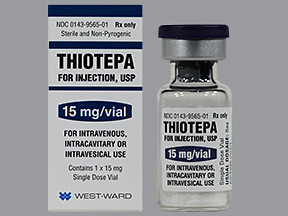

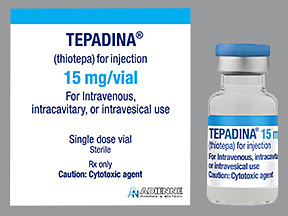
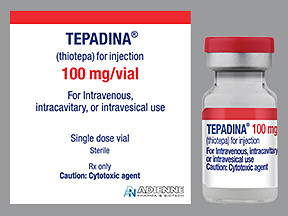
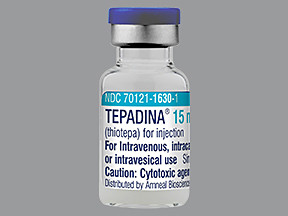
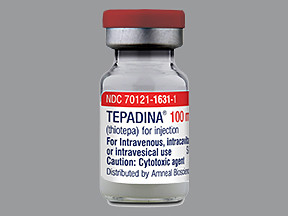
No Reviews Yet